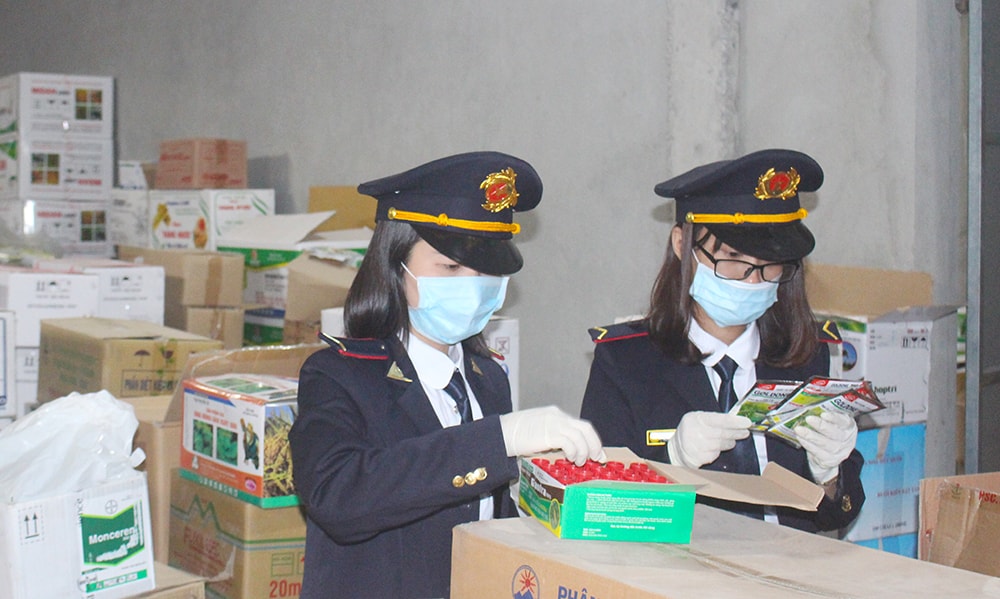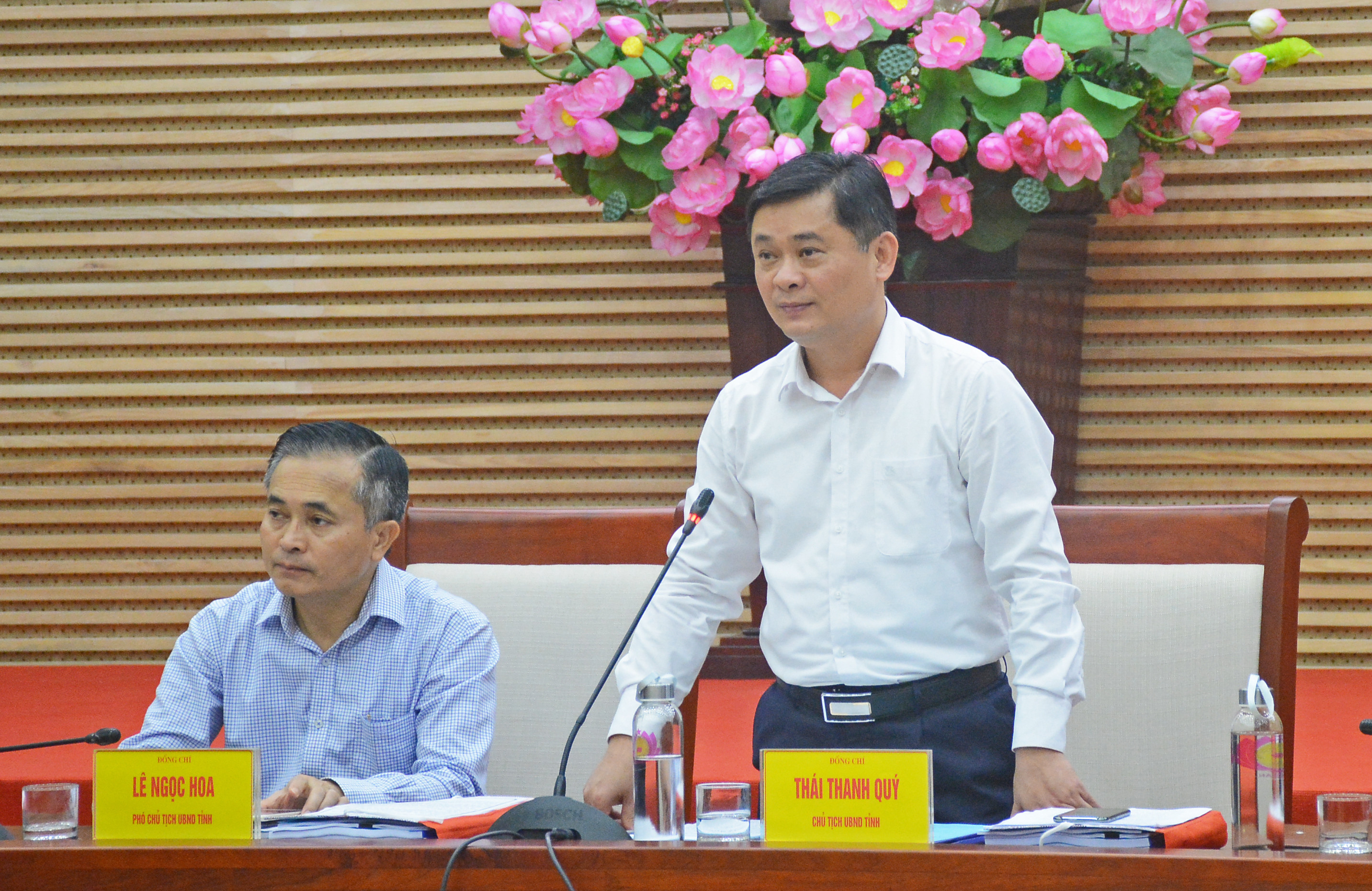Nghe An has more than 950 pesticide residue storage points.
(Baonghean.vn) - The province has investigated and surveyed 240 points, and by 2019, 62 points have been handled. Provincial leaders have directed to continue reviewing the remaining 714 points, and have a plan to handle points with parameters exceeding the permitted level. It is known that handling each point with pesticide residue requires a large amount of funding, about 7-8 billion VND.
At the November 2019 thematic meeting of the Provincial People's Committee held on the morning of November 12, a representative of the Department of Natural Resources and Environment also presented a report on environmental protection work in 2019 and tasks for 2020 and received many interested comments from delegates attending the meeting.
 |
| Officers of the Department of Crop Production and Plant Protection inspect the conditions for trading in plant protection drugs in Dien Chau. Illustration photo: Phu Huong |
11 typical types that pose a risk of environmental pollution
Accordingly, currently in Nghe An province, there are 11 typical types of establishments that pose a risk of causing environmental pollution, including: Pesticide residues; industrial zones (IPs); industrial clusters (ICs); domestic solid waste (SWM); craft villages; mineral exploitation projects; hydropower plants; concentrated livestock farms; agricultural and forestry product processing facilities; aquatic and seafood processing facilities and hospitals.
It is worth noting that in the province there are 954 points of residual plant protection chemicals, 240 points have been surveyed and 714 points are being investigated. Accumulated to 2019, 62 points have been and are being treated, of which 25 points have completed acceptance and handed over the site to the locality, 18 points have completed the treatment works, 19 points are in the process of implementation.
Regarding this issue, the Department of Natural Resources and Environment said that the principle is to investigate and make a preliminary assessment. If any point has parameters exceeding the standard, it will be handled. Points that have not exceeded the allowable threshold will not be handled immediately but there will be warning and protection solutions. According to this industry, to thoroughly handle each point with pesticide residue, it will cost about 7-8 billion VND, of which the Government will support 50% of the cost of handling, the remaining 50% will come from the provincial budget.
Clarifying the source of emissions from hospitals, a representative of the Department of Natural Resources and Environment said that there are currently 50 public and private hospitals emitting medical waste. Some hospitals have invested in building incinerators and centralized wastewater treatment areas, however, in reality, the incinerators are not operating effectively, the wastewater treatment areas are found to be operating insignificantly when the meters are checked, and many hospitals discharge waste outside... This is an issue that needs utmost attention and centralized management solutions, because this type of business causes very high pollution.
Regarding the handling of domestic waste and hazardous waste, according to information, the whole province plans 20 points for domestic waste treatment, in the form of landfill and incineration. "It is necessary to review the method of waste treatment by incineration. As for landfill, like in Binh Duong, people invest heavily and systematically, after burying, they use the gas produced to produce electricity... Along with that, it is necessary to build a waste water treatment system to ensure standards when discharged...", a representative of the Department of Natural Resources and Environment stated his opinion.
 |
| Chairman of the Provincial People's Committee Thai Thanh Quy noted attention to sources that pose a risk of causing environmental pollution. Photo: Thu Giang |
Limit environmental pollution
Emphasizing that the environment is a very hot and current issue, affecting people's health and lives, comrade Thai Thanh Quy - Alternate member of the Party Central Committee, Deputy Secretary of the Provincial Party Committee, Chairman of the Provincial People's Committee, noted issues related to direct pollution. He affirmed that the 11 sources of danger listed are very worrying, and it is necessary to pay attention to monitoring, and where the source of pollution arises, it must be resolved there to limit environmental pollution.
The leaders of Nghe An province pay special attention to the source of pesticide residues. The natural resources and environment sector needs to continue to actively survey the residue points and evaluate the remaining 714 points to see which points are particularly serious, potentially causing harm to people's health, causing cancer... in order to have a focused plan to resolve them immediately.
Regarding industrial parks and industrial clusters, he questioned why only 3/7 industrial parks and 8/22 industrial clusters have wastewater treatment lines so far, requesting relevant units to urgently pay attention, plan and build a specific roadmap, and invest promptly to attract businesses, contribute to increasing budget revenue, creating jobs and ensuring the environment.
 |
| The Chairman of the Provincial People's Committee surveyed and inspected the operation and waste treatment process of Hoang Mai Solid Waste Treatment Plant under T-TECH Vietnam Technology Group in May 2019. Photo: Dao Tuan |
Citing Nam Dinh, the unit that just hosted the 10-year national conference summarizing new rural construction, which has now found a good way to classify waste at the source, the Chairman of the Provincial People's Committee suggested that Nghe An departments and branches learn and adopt it.
“I went to see the model in Nam Dinh, each household has two trash bins, one for organic waste, the other for solid waste. They do it synchronously, widely throughout the province, very methodically. We have to learn, have to ask why they can do it but our province can't? Sorting trash is very convenient for the waste treatment process of factories later,” said comrade Thai Thanh Quy.
Regarding the health sector, the provincial leaders requested the Director of the Department of Health to pay attention to attracting and calling for resources to install wastewater treatment systems in hospitals that are currently lacking, specifically hospitals in Do Luong and Tan Ky districts, to avoid causing pollution to the environment, affecting the lives and health of people.
